Know Your Lore: Orgrim Doomhammer
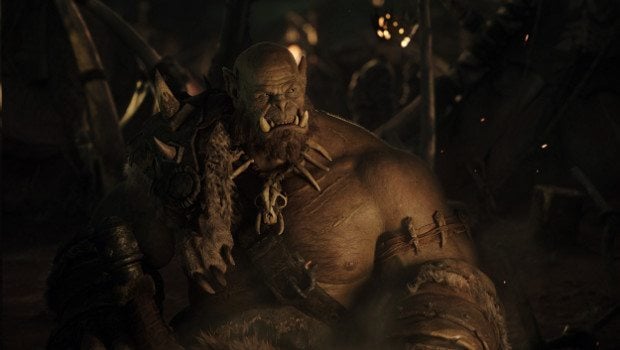
Of all the heroes of the new Horde that Thrall forged in the wake of imprisonment, none stand out quite so much as Orgrim Doomhammer. Not only does Thrall wield his legendary weapon, he even named the capital city of the orcs in honor of the former Warchief of the Horde — Orgrimmar. We caught the smallest glimpse of Draenor’s version of Orgrim while playing through Talador before he was abruptly snuffed out. But his history also spans the original RTS games and novels, in which he was known as the Betrayer by his own kin, the orc that slew Anduin Lothar by the Alliance. And in a little over a year, we’re going to see a third iteration of Orgrim Doomhammer in the Warcraft movie. It may not be exactly the orc we know from history, but another representation. Which leads most people to ask a natural question: Is Orgrim Doomhammer a good guy, or a bad guy?
The most truthful answer I can give you is “Yes.”
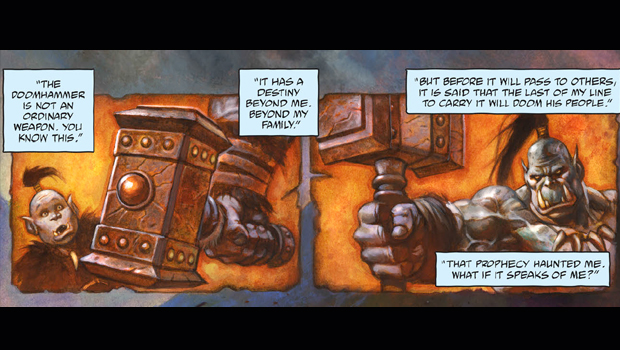 Doomhammer’s destiny
Doomhammer’s destiny
Orgrim Doomhammer was a different kind of child, choosing to ignore clan lines and inexplicably befriend a member of another clan — Durotan of the Frostwolf — when they met at the biannual Kosh’harg festival that brought all the clans together in Nagrand. Despite the fact that this was clearly against tradition for both the Blackrock and the Frostwolf, Orgrim and Durotan became very close, and never stopped being friends throughout their lives. But Orgrim’s destiny was another matter altogether, and something he never really had control of. He would one day inherit the Doomhammer, a mighty weapon his father carried, and he looked forward to that day until a chance meeting between himself, Durotan, and the Prophet Velen revealed a prophecy the weapon carried.
“The last of the Doomhammer line will use it to bring first salvation and then doom to the orc people. Then it will pass into the hands of one who is not of the Blackrock clan, all will change again, and it will once again be used in the cause of justice.”
That prophecy spoken by the wise, ancient Prophet proceeded to haunt Orgrim for the rest of his life, whether he acknowledged it or not. Years later, after his father’s death and after he inherited the weapon and became the Chieftain’s second-in-command, he chose to take it back to the elemental pools in which it was forged. Because that prophecy was loaded with all kinds of unpleasant implications, and Orgrim didn’t want to be the last of the Doomhammer line, and certainly didn’t want to be the one who brought salvation and then doom to his people. He thought he could somehow unmake its destiny and forge a new one in the place where the weapon was created. But he didn’t expect the elemental spirits within the pool to get angry, and he certainly didn’t expect them to take the weapon back. And they wouldn’t return it — punishment, a shaman later told Orgrim, for his pride.
It was at this pool that the Blackrock Chieftain found him, after a series of ogre attacks had nearly destroyed the clan for good. They were on the precipice of extinction, and Orgrim blamed himself. If he hadn’t tried to outwit destiny, perhaps he and the Doomhammer would’ve been enough to turn the tides of battle in his clan’s favor. Instead, he was sitting at the pool and contemplating his death. The Chieftain wouldn’t let him accept it. Instead, he thrust his hand into the pool to retrieve the Doomhammer himself, willing to sacrifice his own life to return Orgrim’s weapon, urging Orgrim to lead the Blackrock to victory. But the elements of the pool saw something different in the Chieftain, and while he was not destined to carry the Doomhammer, they allowed him to take it, wield it for one battle, and return it to its rightful owner. They also gave him a gift of knowledge, teaching him the secrets of imbuing weapons with elemental power. And they gave him one more thing — a scorched, burned, disfigured hand that glowed with the fury of the elemental lava pool.
Blackhand became who he was because of the Doomhammer’s destiny, and became as much a part of the Doomhammer’s legacy as Orgrim himself.
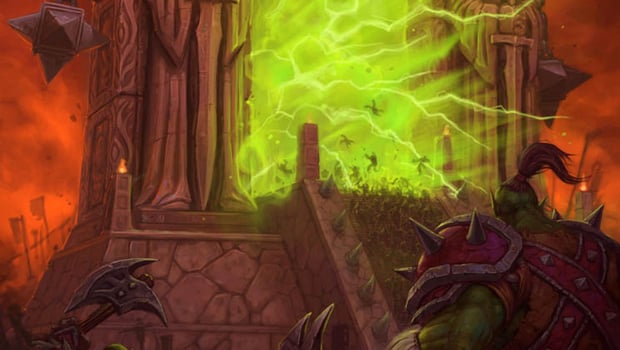 Bring first salvation
Bring first salvation
The orcs were rallied into a war against the draenei — the very people that told Orgrim Doomhammer of his weapon’s legacy in the first place. And he took his place among the Blackrock, following Blackhand into war, intensely loyal to his chieftain. How could he not be, when Blackhand had shown that he was willing to sacrifice his own life for that of his second-in-command, for the lives of every orc in the Blackrock clan? But Orgrim still had his own quiet misgivings about the war, even as he carried out his duties. He watched Blackhand rise from leader of the Blackrock to Warchief of the Horde, and frowned. He gave in to the culture of bloodlust and battle that carried the orcs through the task of systematically driving the draenei to the brink of extinction — but he couldn’t shake the feeling that there was something wrong in all of it, a feeling his friend Durotan shared. The two rarely spoke by that point — Durotan was under suspicion of disloyalty, and Orgrim was oath-bound to report to Blackhand, so sharing information wasn’t in the best interests of either one of them. Yet that sense that something was wrong persisted, and when the blood of Mannoroth was offered to the orcs, Orgrim didn’t drink it. He told Blackhand that he didn’t wish to take the glory of the moment from him, covering for the real reason — that what they were doing was wrong. Blackhand accepted his excuse, but Gul’dan saw right through it, and knew Orgrim Doomhammer was becoming a problem.
When the orcs stormed through the Dark Portal at Gul’dan’s behest, they found lands rich with resources for the taking, provided they could clear out the humans that stood in their way. Durotan and the Frostwolves were exiled for their steadfast refusal to participate in Gul’dan’s plans. Durotan and his mate, Draka, made one final journey to find Orgrim Doomhammer, to tell him the truth that Durotan had known all along — Gul’dan was responsible for everything. He was leading the Shadow Council, and driving the orcish race to ruin. Blackhand was no Warchief, he was simply one of Gul’dan’s tools. It was the last time Orgrim Doomhammer would see his friends, for Gul’dan’s spies were everywhere and witnessed the confession. They ambushed Durotan and Draka on the way back to the Frostwolf clan, murdered them both and left their infant son to die in the wilds.
Orgrim was one of Blackhand’s most trusted lieutenants, and he continued to bide his time, following orders and slaughtering Alliance, all while waiting for the right opportunity to strike. When Gul’dan was sent into a coma, trying to pluck secrets of power from Medivh, Orgrim seized his opportunity and struck. He killed Blackhand, took the mantle of Warchief for himself, and led the Horde to a decisive victory over the Alliance. And while Gul’dan was indisposed, he caught and tortured Garona, forcing the assassin to reveal the location of the Shadow Council, then systematically hunted the warlocks down and destroyed them, too. But his victory wasn’t without its costs. Most orcs were loyal to Blackhand, and Orgrim’s act of justice was seen as immense betrayal. He’d turned on his clansman and commander without a second thought — and earned himself the title Backstabber as a result.
Yet despite his betrayal of Blackhand, he led the Horde to victory. And even if they weren’t all aware of Gul’dan’s scheming, Orgrim’s actions had also freed them all of the Shadow Council’s meddling. The promise of salvation had been handily delivered.
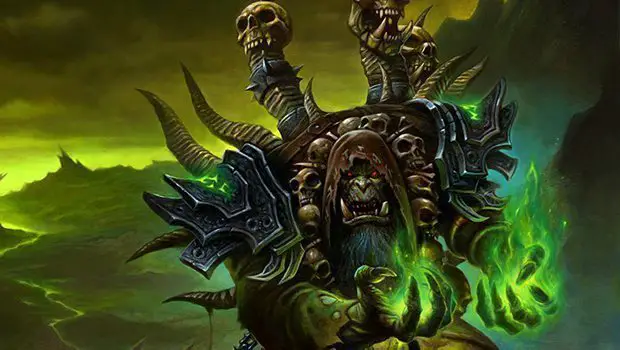 And then doom
And then doom
When Gul’dan finally woke from his coma, he found himself without Blackhand, without a Shadow Council, and instead faced with the question of why Orgrim should not slay him on the spot. But this is really the moment that Orgrim Doomhammer made the single biggest mistake of his life. Had he simply killed Gul’dan, he might have succeeded. Instead, he listened to the warlock, who hastily took the opportunity to remind Orgrim that he without the Shadow Council, the Horde had no magic that could withstand the human sorcerers, except for him. And he, in turn, could be very useful and give Orgrim an army of powerful necromancers — the first Death Knights. Despite his misgivings, Orgrim agreed to allow Gul’dan to do this, and kept him on what he thought was a tight leash when the Horde ramped up to take the rest of the Eastern Kingdoms in the Second War. They were, in fact, pretty victorious on that front as well, making it all the way to Lordaeron with the help of several races that Orgrim had cleverly managed to creation diplomatic ties to, trolls and goblins alike. He even managed to make a deal with Lord Perenolde of Alterac, promising him that his lands would not be attacked in exchange for safe passage through the mountains to Lordaeron’s capital.
It would have been a resounding victory if Gul’dan had not abandoned the Horde. But he did, taking his clan and the Twilight’s Hammer with him, setting off to the south to find the Tomb of Sargeras. Orgrim followed him, tracked him down, and saw the traitors destroyed, but it was far, far too late. Weakened by Gul’dan’s desertion, the Horde was pushed back all the way to Blackrock Spire, where they fought the final battle of the Second War against the human champion Anduin Lothar and his armies. Orgrim faced off against Lothar himself and won, killing the Alliance’s Supreme Commander in hopes of turning the tide. But Lothar’s second-in-command, Turalyon, rallied the troops into a frenzy because of Lothar’s death, striking the final deathblow to the Horde, ending the Second War, and capturing Orgrim Doomhammer in the process.
He was not executed. He was taken back to Lordaeron, imprisoned, held as a curious oddity in the palace of King Terenas. Orgrim managed to escape, but it was far too late to do anything for the rest of the orcish race. They were systematically captured and imprisoned in internment camps, stricken with a strange lethargy that plagued Orgrim himself … and he at last began to slowly realize that just as the prophecy said, he’d led his people to salvation, and then to doom. He escaped the internment camps, horrified at what he had done and barely able to resist the lethargy himself, taking to the woods to live out the rest of his days as a hermit, traveling between the few clans that had escaped capture themselves, and trying to figure out a way to return his people to their former glory. It seemed impossible. The Horde was lost. The orcish race was lost, without hope, doomed to experience their own slow extinction on a world that was not their own, and he was responsible for it.
This was the Orgrim Doomhammer that Thrall first encountered — the hermit, the former Warchief fallen from grace. And it was Thrall’s curious spark of determination that fueled Orgrim into taking up the Doomhammer once more and returning to the fight. His friend Durotan might have been gone, but his son lived on, eager and willing to inspire and infuse the orcs with a purpose that shook them from their lethargy, gave them the will to fight and the will to be free. Thrall’s determination managed to free four interment camps with Orgrim and Drek’thar’s help — the Alliance didn’t see it coming. But the fifth camp was prepared, and Orgrim was mortally wounded in the ensuing battle. With his last breaths, he handed the Doomhammer to Durotan’s son, proclaiming him Warchief of the Horde, and died with the hope that destiny was fulfilled, that Thrall would change the Horde for the better and that the Doomhammer would at last be used in the cause of justice.
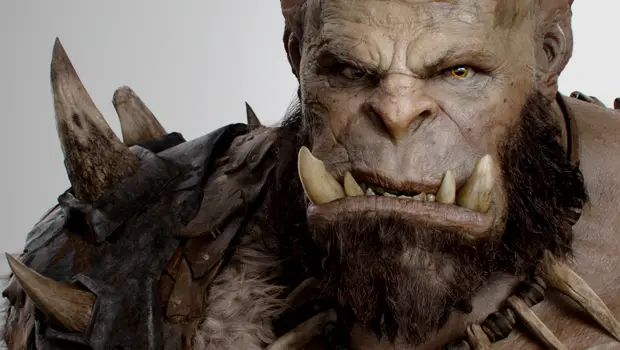 Legacy
Legacy
Orgrim Doomhammer wasn’t a hero to his people. He led them to one decisive victory, but he did so after committing a massive act of betrayal that colored the orc’s opinions of their leader, and then proceeded to take that win and turn it into a massive loss that nearly cost the lives of the entire orcish race. Sure, he came back and freed some internment camps, made Thrall the next Warchief, passed the Doomhammer on … but what kind of creature was Orgrim, really?
And that’s what I’m excited to see in the Warcraft movie, because at this point, we don’t know where the film cuts off. Does it finish at the end of the First War, at the height of Orgrim’s triumph? Does it show the decline of the orcish race, does it show Orgrim learning of the prophecy that loomed over him like an inescapable shadow for the majority of his life? Or does it play through the Second War, do we see Gul’dan’s betrayal and the Horde’s fall?
We don’t really know, and we won’t until the movie is closer to release. But Orgrim Doomhammer is a fascinating character because so much of his struggle was internal. He was at constant odds with himself, wanting to do what was best for the Horde, but aware, somewhere in his gut, that what the Horde was doing was wrong. He was intensely loyal and grateful to Blackhand, but at the same time, he could see what Blackhand had become, what the Horde was slowly in danger of becoming. And he likely knew, he had to know that any actions he took to save the orcish race would be seen as betrayal, because his race was so far gone down the path of corruption that they didn’t even recognize where that road would eventually take them. So he was faced with the unenviable choice of letting his people happily drive themselves to certain ruin, or earning their ire by forcibly steering them the other way. And he never lived to see the result. He never lived to see the Horde whole and triumphant once again.
Orgrim Doomhammer was an orc who lived a life of constant battle, both external and internal — and the vicious, bloodthirsty battles he waged against the draenei and the Alliance paled in comparison to the war that waged within.
Please consider supporting our Patreon!
Join the Discussion
Blizzard Watch is a safe space for all readers. By leaving comments on this site you agree to follow our commenting and community guidelines.
 @Shadesogrey
@Shadesogrey




